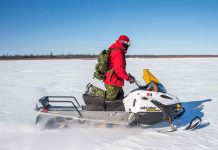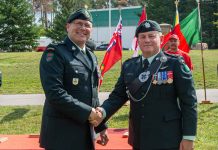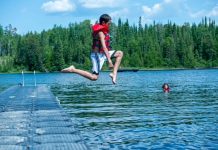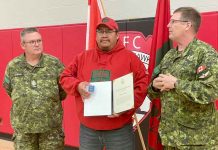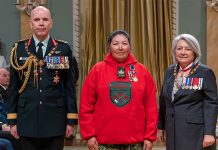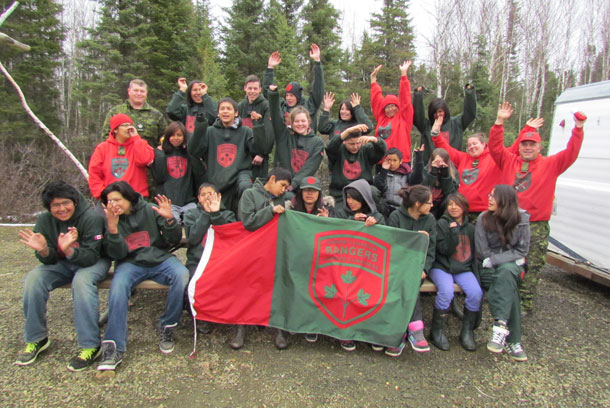

THUNDER BAY – Junior Canadian Rangers from three communities have completed a joint on-the-land training exercise that helped them to build friendships while providing them with three days of training that placed a heavy emphasis on being safe on the land and water and in their personal life styles.
The Junior Rangers came from patrols in Lac Seul and Mishkeegogamang, two First Nations separated by a lengthy five-hour drive. The training was conducted at a community camp site on Kapkichi Lake, north of Pickle Lake, which is on Ontario’s most northerly section of paved highway.
The Junior Rangers are a Canadian Army program for boys and girls aged 12 to 18 in remote and isolated communities across Canada’s North.

The Junior Ranger patrol in Mishkeegogamang is unique in northern Ontario because it serves both the Ojibwa community and the town of Pickle Lake. Much of its training is done in the town, which is a 45-minute drive from the reserve. As a result, several of its members are non-Aboriginal. It was named Ontario’s top Junior Ranger patrol last year.
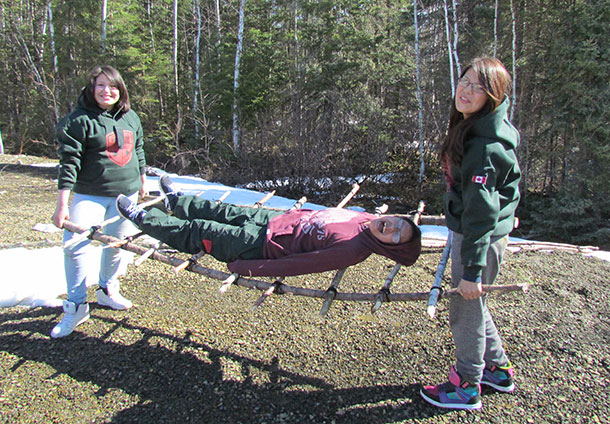
Despite having to drive long distances the Junior Rangers train together as frequently as they can, often on a monthly basis, in either Lac Seul, Mishkeegogamang, or Pickle Lake. “We try to get the kids together as often as we can,” said Master Corporal Brent Labine, the Canadian Ranger commanding the Mishkeegogamang Junior Ranger patrol. “They become friends and keep in touch by Facebook.”
The most recent on-the-land training session at Kapkichi Lake included first aid training, learning how to build improvised stretchers, bannock making, playing games, and making friends around a camp fire.
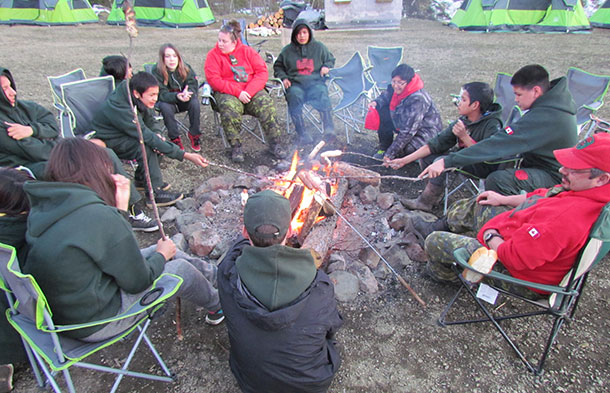
“One of the biggest things about a training exercise like this is it gets the kids away from technology,” Master Corporal Labine, a teacher in Pickle Lake, said. “We don’t have cell phone service out here. There’s no WiFi. They have to go three days without it while they are here. They sit around a camp fire and talk with each other. That’s a huge plus. They learn how to set up a camp and live in it. They learn first aid, how to build a stretcher, and learn knots and lashings.”
Justice Brisket, 17, of Lac Seul, a Junior Ranger for several years, said she tries to attend as many joint training exercises as she can. “I like meeting other people,” she said, “doing different things with training, learning new things, and having fun. We talked until one (o’clock) in my tent. I know my group enjoyed it.”
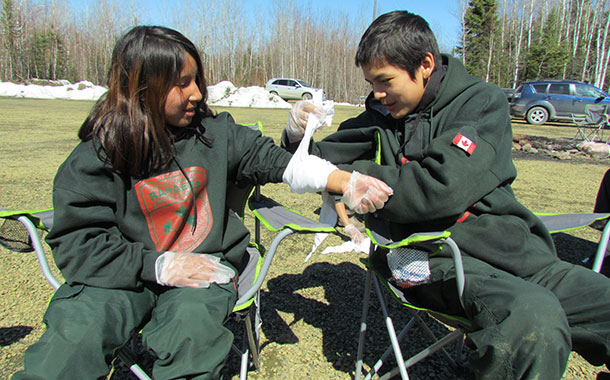
Warrant Officer Wesley Jenkins, an army instructor, said the relationship between the Lac Seul and Mishkeegogamang patrols is unusually close. “It’s a relationship that’s been fostered over the last three years,” he said. “The highway is a key component to inter-operability but the Junior Rangers manage to keep in touch with each other by Facebook, telephone, text, whatever.”
The most important part of the three days of training, he said, was the instruction in first aid. “The amount of time these young people spend on ATVs, snow machines, boats, and canoes in places where there is no cell service and where satellite phones are not something that everyone has makes the need for first aid significant. Sometimes the best way to learn is through a couple of mistakes. So we had some really good stretchers built and some that needed some work.
“But at the end of it all, everyone is going home having learned something useful. It was a good exercise.”
The first aid instruction was taught so that it related to the life styles of the Junior Rangers in their home communities. They were taught how to approach an injured or sickperson, assess the severity of the need summon help, and provide basic first aid until expert help becomes available.
“Knowing this might help me some time when I might need it,” said Christian Caie, a Pickle Lake member of the Mishkeegogamang patrol. Having just turned 18 he has applied to become a Canadian Ranger. “I’m looking forward to it,” he said.
Sgt. Peter Moon
Article and photographs by Sgt. Peter Moon
(Sergeant Peter Moon is the public affairs ranger at 3rd Canadian Ranger Patrol Group at Canadian Forces Base Borden.)

